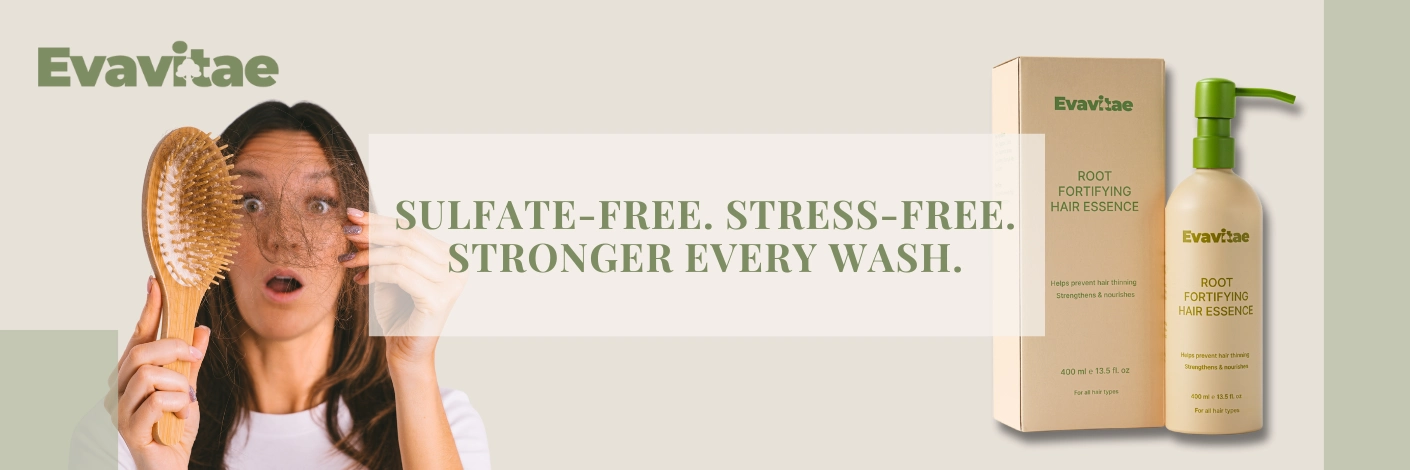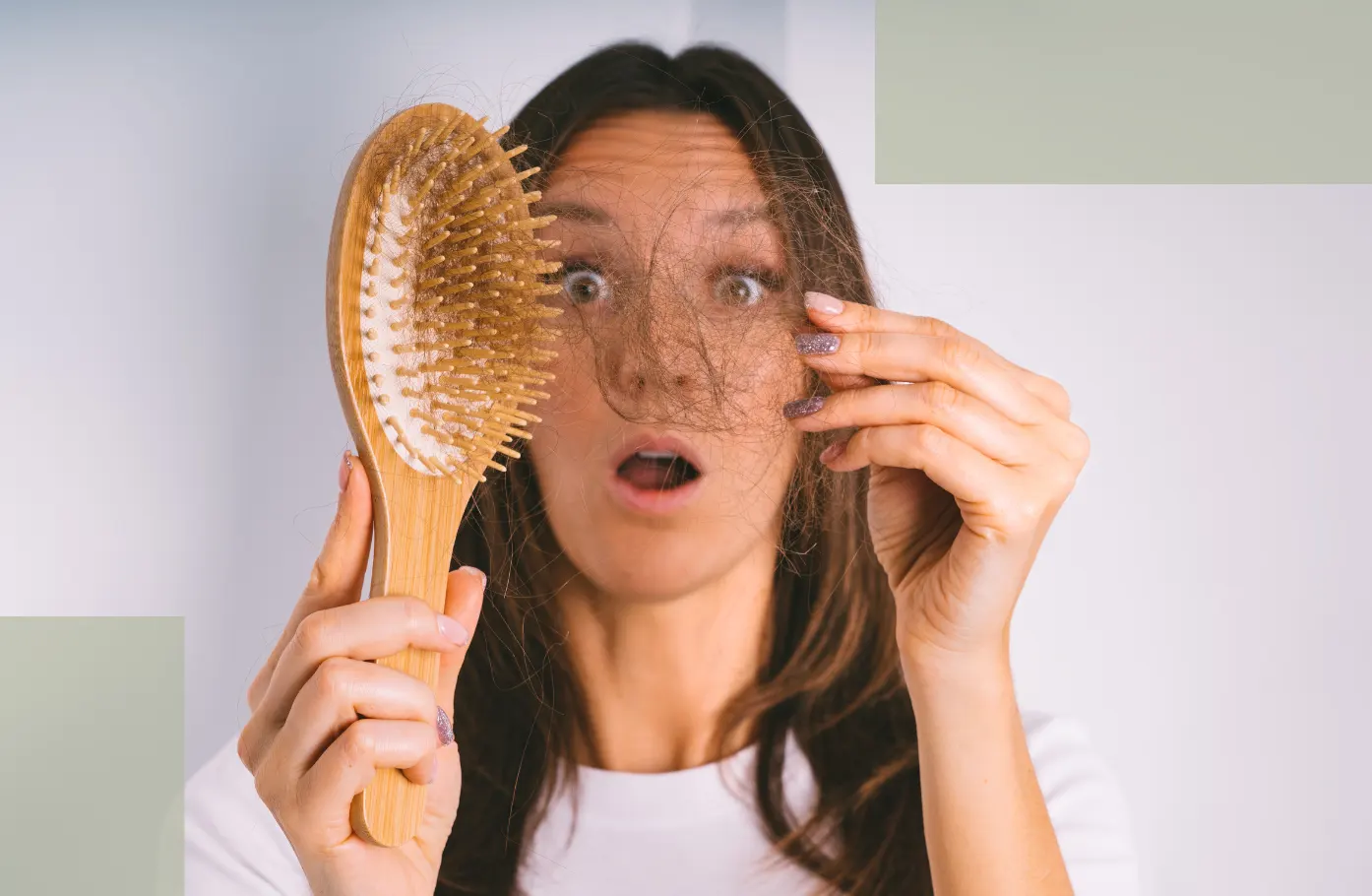Hair loss can be caused by far more than genetics or stress.
For many, it’s a reflection of internal imbalance — when the scalp and follicles simply aren’t getting what they need to function.
If you’ve ever wondered what deficiency causes hair loss, the answer isn’t always obvious, but understanding your nutrient profile can be the first step toward real recovery.
Read More:Evavitae Hair Care Blog — Hair & Scalp Health Insights
1. Why Nutritional Deficiency Can Cause Hair Loss
Hair growth depends on the rapid division of follicle cells — among the most metabolically active cells in the human body.
These cells require an abundant and steady supply of energy and nutrients.
When nutritional intake is insufficient, your body prioritizes vital organs like the heart and brain, while temporarily cutting off nutrients to non-essential tissues — including your hair.
In both women and men, hair loss can serve as an early warning sign of nutritional imbalance or absorption issues.
According to Healthline’s clinical overview,
deficiencies in vitamins, iron, zinc, protein, and essential fatty acids have been linked to various types of hair loss — including telogen effluvium and chronic diffuse thinning.
2. Common Deficiencies and Their Hair Loss Patterns
Nutrient | Mechanism of Deficiency | Typical Hair Impact | Dietary Sources & Tips |
Iron (Ferritin) | Low ferritin reduces oxygen supply to follicles | Hair becomes fine, brittle, and sparse | Red meat, spinach, lentils; women should monitor post-menstrual levels |
Zinc | Regulates keratin production and sebum balance | Dry scalp, dandruff, fragile strands | Nuts, pumpkin seeds, shellfish; consider supplementation if severely deficient |
Vitamin D | Regulates follicle cycling and cell turnover | Thinning at crown, seasonal shedding | Sunlight, cod liver oil, fortified milk |
B Vitamins (Biotin, B12, B6) | Support keratin synthesis and energy metabolism | Dull, weak hair; fatigue | Whole grains, eggs, leafy greens |
Protein | Hair’s structural component; deficiency slows growth | Reduced density, halted growth | Meat, legumes, dairy |
Essential Fatty Acids (Omega-3) | Maintain scalp barrier and anti-inflammatory response | Dryness, flaking, folliculitis | Fatty fish, flaxseed oil, walnuts |
Clinically, iron zinc deficiency hair loss is among the most common types — particularly in women during menstruation, pregnancy, or restrictive dieting.
Addressing nutrient deficiencies internally is essential, but pairing that effort with the right topical products can boost visible results. Discover more in our review of biotin shampoo for hair growth and what to look for in an effective formula.
3. Why “Hair Growth Vitamin” Isn’t a Universal Solution
When hair thinning begins, many people rush to buy hair growth vitamins, assuming supplements alone can solve the problem.
However, not all hair loss stems from nutrition — and blind supplementation can sometimes make things worse.
The real question is: What exactly are you missing?
Different individuals experience hair loss for different reasons:
- Women often face low ferritin, postpartum hormonal changes, or nutrient malabsorption from restrictive diets.
- Men may develop mineral imbalances from chronic stress or high-fat diets.
- Others experience non-nutritional hair loss linked to hormonal, inflammatory, or autoimmune factors.
The right approach:
①Test first — Measure ferritin, zinc, vitamin D, and B12 before supplementing.
②Target your supplement strategy — Deficiencies vary by gender, age, and lifestyle. Vegans often lack iron or zinc; indoor workers often lack vitamin D.
③Maintain balanced nutrition — Whole foods remain irreplaceable. Diets rich in lean proteins (eggs, fish, legumes), antioxidants (berries, green tea), and minerals help maintain follicle metabolism and repair.
NIH reports that excessive intake of iron or zinc can disrupt mineral absorption, strain the liver, and cause gastrointestinal irritation.
In short: “More” isn’t “better.”
Hair growth vitamins only work when targeted to real deficiencies and paired with long-term, sustainable care.
For lasting results, internal balance must be supported by external scalp health — for example, a mild, nutrient-balanced formula like Evavitae Anti-Hair Loss Shampoo, designed to maintain scalp stability and nutrient absorption at the follicular level.
4. The “Inside-Out Hair Recovery Routine”
Improving nutrition-related hair loss isn’t just about supplements — it’s about rebuilding your scalp environment.
Nutrition and topical care work together, amplifying each other’s effects.
Phase | Internal Nutrition | External Scalp Care |
Stage 1 | Test and correct key nutrients (iron, zinc, vitamin D) | Use a gentle, amino-acid-based anti-hair loss shampoo like Evavitae |
Stage 2 | Increase protein and omega-3 intake to improve circulation | Combine with scalp massage for better absorption |
Stage 3 | Follow an anti-inflammatory diet rich in antioxidants | Continue a low-irritation, fragrance-free routine to maintain barrier health |
This inside-out approach helps restore balance, allowing hair follicles to re-enter their natural growth cycle.
Read more:PubMed — Nutrient Deficiency and Hair Loss Correlation
5. Why Evavitae’s Formula Is Gentle Yet Effective
At Evavitae, we believe in “From Within, For Real Results.”
True recovery happens when scientific nutrition meets gentle, consistent scalp care — because a calm, balanced environment is what allows hair to grow stronger from the roots.
Scientific balance + gentle cleansing = sustainable regrowth.
Evavitae Anti-Hair Loss Shampoo uses an amino acid–based surfactant system instead of harsh sulfates (SLS, SLES).
This formula — combining Disodium Laureth Sulfosuccinate, Cocamidopropyl Betaine, and natural amino acids — cleanses effectively without stripping the scalp’s protective barrier.
Its mild pH (~5.5) preserves the skin’s natural acid mantle, preventing dryness and micro-inflammation while improving active ingredient absorption.
Key Active Ingredients:
- Biotin (Vitamin B7) — Reinforces keratin and prevents breakage
- Ginseng Extract — Boosts microcirculation and strengthens follicles
- Niacinamide (Vitamin B3) — Soothes irritation and supports barrier function
- Batana Oil — Restores moisture and lipid balance
Together, these components ensure a formula that cleanses gently, supports scalp balance, and promotes follicle health over time.
Unlike aggressive “intensive” shampoos, Evavitae focuses on long-term tolerance and scalp comfort — suitable for sensitive, postpartum, or nutritionally recovering users.
Even if you’re currently supplementing with hair growth vitamins, gentle cleansing remains essential.
At Evavitae, we see every wash as part of the healing process, not another source of irritation.
6. Final Thoughts
Hair loss is often the body’s quiet way of saying something is off-balance.
When nutrient deficiencies affect follicle metabolism, the best response isn’t panic supplementation — it’s testing, adjusting, and maintaining.
- Prioritize iron, zinc, vitamin D, and protein
- Combine nutritional balance with gentle scalp care
- Restore your body’s natural rhythm from the inside out
Evavitae promotes a holistic approach to hair wellness — where nutrition and care work together to bring back strength, shine, and confidence.
Discover more:Evavitae Anti-Hair Loss Shampoo
Discover what really helps after childbirth in our Postpartum Hair Recovery Guide.
Evavitae products are now available exclusively at www.evavitae.com.





Add comment
You must be logged in to post a comment.